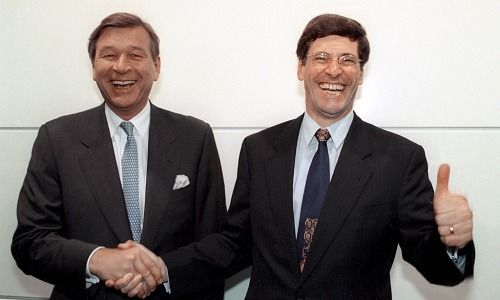UBS 20 Years Ago: A Risky Intention
The deal logic was clear: globalization and deregulated financial markets had spurred banks to bulk up in order to achieve critical mass, SBC chairman Georges Blum argued. «Neither of the two banks has the international strength for long-term success,» he said. Two months later, shareholders green-stamped the deal, with Cabiallavetta as chairman and Ospel as CEO.
Unthinkable Profit Goal
How does modern-day UBS stack up against the goals laid out when Swiss Bank Corporation and Union Bank of Switzerland embarked on a mega-merger 20 years ago?

Mixed to poorly in an unflinching evaluation. The bank reached its billion-franc profit goal just once: in 2004, and then only thanks to the windfall from selling three private banks and asset manager GAM to Julius Baer. The profit goal became unthinkable following the ructions of the financial crisis of 2008/09.
Jewish Claims
UBS pre-crisis years were marred by spending on deals such as U.S. broker Paine Webber (21.8 billion francs) or Brazilian investment bank Banco Pactual (3.1 billion francs). For the merger to happen at all, the bank had to address claims by Jewish organizations and the U.S. government over dormant assets of Holocaust victims.
The two merger banks forked up two-thirds of the total 1.8 billion francs that the wider Swiss industry agreed to pay in order to settle the allegations. Work behind the scenes to dig through the data and process the claims tallied up at least as much, even if exact numbers have never been disclosed.
Biggest Setback
UBS’ biggest setback following the merger was U.S. hedge fund LTCM, which hit the Swiss bank with roughly 1 billion francs in losses – as well as costing Cabiallavetta the chairman’s job. The hedge fund losses were paltry in comparison to the 37 billion francs that UBS was forced to write off due to subprime mortgage securities in 2007 and 2008.

Neither the dormant accounts scandal nor LTCM were existential for UBS: before the merger, Union Bank of Switzerland was rock solid, while SBC was thinly capitalized. «Swiss Bank Corporation didn’t really need the merger, and the former UBS even less so. Both could have survived on their own,» ex-SBC Chairman Blum wrote two years ago.
 Robert Vogler is a historian and was the spokesman of Union Bank of Switzerland from 1988 until 1998. After the merger, he was head of historical research and until 2009 a senior political analyst of political policy for UBS.
Robert Vogler is a historian and was the spokesman of Union Bank of Switzerland from 1988 until 1998. After the merger, he was head of historical research and until 2009 a senior political analyst of political policy for UBS.
- << Back
- Page 2 of 2



























